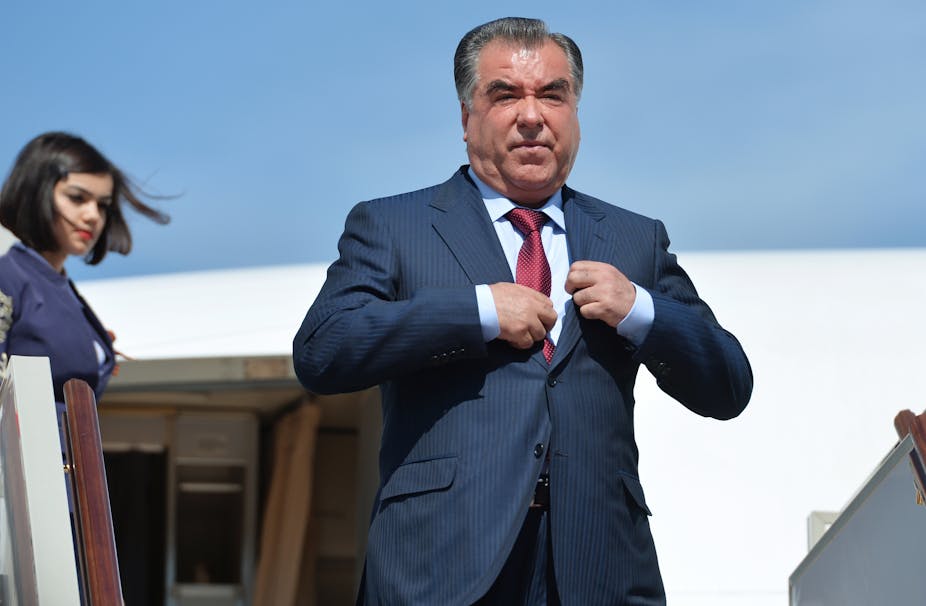As Tajikistan marks 25 years since its independence from the Soviet Union, the fragile peace it has made has been offset by a brutal crackdown on the opposition and an impending economic crisis.
The Central Asian republic was born amid political turmoil, and quickly descended into a civil war that cost more than 50,000 lives and turned some 250,000 people into refugees. A peace agreement in 1997 formally brought the war to an end, but the president, Emomali Rahmon, who came to power during the fighting, has now eradicated the opposition with whom he negotiated the accord; this year, he won a referendum allowing him to rule indefinitely.
Order has returned since the chaos of the war ended, but memories of the peace are receding. The real dividends have gone to the president, his circle, and a few hundred families who are closely tied to the regime.
To many Tajiks, this year’s anniversary celebrations won’t feel all that celebratory. They will be tightly managed by the state, with no room for spontaneous public participation, critical comment or dissent. Approximately half the working-age male population will be absent from these celebrations, as they have migrated to Russia and other countries for work, and many of the country’s women, children and elderly citizens will have little enthusiasm for the anniversary when their economic prospects are so bleak.
Inflation and the depreciation of the currency have made the ordinary Tajik poorer this year. Around half of the country’s income depends on Tajiks working abroad and sending money home, but according to Russia’s Central Bank, the amount of money transferred from Russia to Tajikistan fell precipitously from $3.8 billion in 2014 to $1.28 billion in 2015. The National Bank of Tajikistan reports that the figure slid a further 22% in the first half of 2016.
National economic development is painfully slow. The highest hydroelectric dam in the world is due to be built in Rogun before the end of the decade to export electricity to South Asia. But what resources Tajikistan has are generally used for the benefit of the few, not the many – look at the aluminium industry, for example, whose profits are channelled into secretive offshore accounts.
Worse still, the apparent pacification of the country conceals the by turns banal and brutal ways in which control is maintained.
The media is supressed; business is co-opted. The government has gradually discredited the last remaining political opposition, accusing it of links to Islamist terrorism as a pretext for crushing it. Political prisoners are arbitrarily arrested, abused and tortured in Tajikistan’s prisons, and their lawyers and relatives are intimidated and detained. A recent Human Rights Watch report found that “torture remains widespread in the criminal justice system” and that the police “routinely use torture to coerce confessions and deny detainees access to counsel”.
In recent weeks, a group of leading Tajikistani civil society and human rights activists appealed to the UN and international community to publicly demand that the government complies with its own laws and international commitments.
Of particular concern to these activists is the status of prisoners linked to the Islamic Renaissance Party (IRPT), whose leader signed the 1997 peace agreement.
Beyond the pale
Despite years spent carefully toeing a moderate line in the face of electoral fraud and repression, the IRPT was banned in 2015. This summer, two political prisoners linked to the party, Kurbon Mannonov and Nozimdzhon Tashripov, died in Tajikistan’s prisons. The health of another prisoner, former deputy chairman of the IRPT Mahmadali Hayit, is also in danger, and on August 22, his wife and son were taken from their home by men in plain clothes and have not been seen since. On August 29, Hayit’s lawyer was remanded in custody.

One of the few IRPT leaders to have escaped imprisonment is its chairman, Muhiddin Kabiri, who went into exile in 2015. A genial man who maintained a persistently moderate stance in opposition, Kabiri is now wanted in Tajikistan on charges of terrorism. Given the obvious political motive for the campaign against the party and the government’s abuse of its members, it is astonishing that INTERPOL agreed to a Tajik request to put out a global “red notice” for his arrest.
Western states’ public expressions of concern about all this mean little without serious threats to end military aid and security co-operation. As things stand, the West seems happy to keep spending millions of dollars a year on Tajik border security, counter-terrorism and military training. These governments are apparently unwilling to accept that providing military aid and security training to a country that behaves like Tajikistan is ineffective, and perhaps even counter-productive.
The Tajik government, which obviously gives itself full credit for the fact that civil war has not returned, must be held responsible for the increasingly brutal authoritarianism and the economic decay which has marred the post-war era. INTERPOL, which claims to uphold international human rights standards, should make sure it is not exploited to serve the government’s political motives.
Tajikistan’s recovery and relative stability since the civil war should be a cause to celebrate – but a peace managed with such means is no peace at all.

